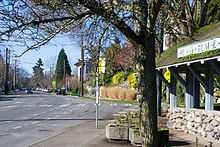Denny-Blaine, Seattle


Denny-Blaine is a neighborhood in east central Seattle, Washington. It is bounded on the east by Lake Washington; on the south by E. Howell Street, beyond which is Madrona; on the west by 32nd Avenue, beyond which is Madison Valley; and on the north by Lake Washington Boulevard E., Hillside Drive E., and E. Prospect Street, beyond which are Washington Park and Madison Park.
The neighborhood's main thoroughfares are E. Denny Way and E. Harrison Street (east- and westbound) and Dorffel Drive E. and Lake Washington and McGilvra Boulevards E. (north- and southbound). Denny-Blaine Park is on the Lake Washington waterfront at the foot of E. Denny-Blaine Place.
The Denny-Blaine neighborhood is one of the most affluent and exclusive neighborhoods in Seattle.
History
The neighborhood is named after its developers, Elbert F. Blaine and Charles L. Denny, who began subdividing the area in 1910. Denny was the son of Seattle pioneer Arthur Denny.
It was in his greenhouse at 171 Lake Washington Blvd. E. where Kurt Cobain was found dead in 1994. The greenhouse was razed by his wife, Courtney Love, shortly thereafter and the house and property were subsequently sold to a private party. A poignant memorial to the influential and troubled rocker can be found next door in Viretta Park, where messages and dedications have been carved into wooden benches.
References
| Wikimedia Commons has media related to Denny-Blaine, Seattle, Washington. |
Coordinates: 47°37′7″N 122°16′55.3″W / 47.61861°N 122.282028°W